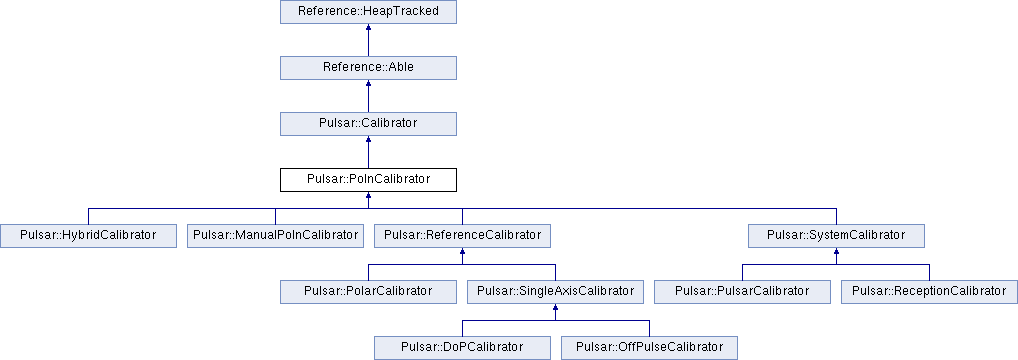 PSRCHIVE
PSRCHIVE
| Ask a Question | Search PSRCHIVE: |
 PSRCHIVE
PSRCHIVE
| Ask a Question | Search PSRCHIVE: |
 Home Home
|
Public Member Functions |
Static Public Attributes |
Protected Member Functions |
Protected Attributes |
List of all members
Pulsar::PolnCalibrator Class Reference Polarimetric calibrators. More...
Inheritance diagram for Pulsar::PolnCalibrator:

Detailed DescriptionPolarimetric calibrators. The calibrated archive will have its flux normalized by the calibrator flux, such that the FluxCalibrator class need only multiply the archive by the absolute calibrator flux. Polarimetric calibration does not require a flux calibrator in order to work. Constructor & Destructor Documentation◆ PolnCalibrator()
Construct with optional processed calibrator Archive. If a Pulsar::Archive is provided, and if it contains a PolnCalibratorExtension, then the constructed instance can be used to calibrate other Pulsar::Archive instances. References Pulsar::Calibrator::extension, Pulsar::Calibrator::filenames, poln_extension, and set_calibrator(). Referenced by get_response(), get_response_nchan(), Pulsar::HybridCalibrator::HybridCalibrator(), PolnCalibrator(), Pulsar::ReferenceCalibrator::ReferenceCalibrator(), Pulsar::HybridCalibrator::set_precalibrator(), Pulsar::SystemCalibrator::set_previous_solution(), and setup_transformation(). Member Function Documentation◆ calculate_transformation()
Derived classes can create and fill the transformation array. Reimplemented in Pulsar::HybridCalibrator, Pulsar::ReferenceCalibrator, and Pulsar::SystemCalibrator. References covariance, poln_extension, and Pulsar::Calibrator::verbose. Referenced by setup_transformation(). ◆ calibrate()
Calibrate the polarization of the given archive. Upon completion, the flux of the archive will be normalized with respect to the flux of the calibrator, such that a FluxCalibrator simply scales the archive by the calibrator flux. Implements Pulsar::Calibrator. Reimplemented in Pulsar::DoPCalibrator, Pulsar::ManualPolnCalibrator, and Pulsar::OffPulseCalibrator. References calibration_setup(), do_backend_correction, Pulsar::Calibrator::filenames, Pulsar::Archive::get(), Pulsar::IntegrationManager::get_Integration(), Pulsar::Archive::get_nchan(), Pulsar::Archive::get_npol(), Pulsar::IntegrationManager::get_nsubint(), get_type(), Pulsar::Profile::get_weight(), Pulsar::Archive::getadd(), Signal::ReferenceFluxDensity, response, Pulsar::Receiver::set_basis_corrected(), Pulsar::Archive::set_poln_calibrated(), Pulsar::Archive::set_scale(), subint, Pulsar::Calibrator::variation, Pulsar::Calibrator::verbose, and Pulsar::IntegrationManager::verbose. ◆ get_Info()
Return plotting information. Reimplemented from Pulsar::Calibrator. Reimplemented in Pulsar::SingleAxisCalibrator, and Pulsar::SystemCalibrator. Referenced by Pulsar::CorrelationInfo::CorrelationInfo(), and Pulsar::SystemCalibrator::get_Info(). ◆ get_maximum_nchan()
Derived classes may be able to shrink the transformation array. Some calibrators (e.g. HybridCalibrator) may be capable of shrinking the size of the transformation array to match the number of frequency channels in the observation. If this is done, and the next observation to be calibrated has more channels than the first, then the transformation array should be recomputed to match the new frequency resolution. However, to date, the decision to recompute the transformation array has been based on it having zero size. It is not possible to compare tranformation.size() with get_nchan(), because PolnCalibrator::get_nchan makes the same comparison and returns transformation.size(). Rather than add a new method that must be implemented by all of the derived classes, this new method gives shrink-capable classes the opportunity to communicate this feature. By default, the method returns zero. Otherwise, it should return the maximum possible size of the transformation array that can be supported. Reimplemented in Pulsar::HybridCalibrator. ◆ get_nchan()
Get the number of frequency channels in the calibrator. Implements Pulsar::Calibrator. Reimplemented in Pulsar::HybridCalibrator, Pulsar::PulsarCalibrator, and Pulsar::SystemCalibrator. References get_nchan(). Referenced by Pulsar::PulsarCalibrator::add_pulsar(), Pulsar::DoPCalibrator::extra(), Pulsar::HybridCalibrator::get_nchan(), get_nchan(), get_solver(), has_covariance(), Pulsar::PulsarCalibrator::setup(), Pulsar::PulsarCalibrator::solve1(), and Pulsar::PulsarCalibrator::update_solution(). ◆ get_solver()
Return the transformation for the specified channel. Reimplemented in Pulsar::SystemCalibrator. References Pulsar::PolnCalibratorExtension::Transformation::get_chisq(), get_nchan(), Pulsar::PolnCalibratorExtension::Transformation::get_nfit(), Pulsar::PolnCalibratorExtension::Transformation::get_nfree(), has_solver(), and poln_extension. ◆ get_transformation() [1/2]
Return the transformation for the specified channel. Return the system response for the specified channel. References setup_transformation(). ◆ get_transformation() [2/2]
Return the transformation for the specified channel. Return the system response for the specified channel. References setup_transformation(). Referenced by Pulsar::PulsarCalibrator::add_pulsar(), Pulsar::DoPCalibrator::extra(), Pulsar::OffPulseCalibrator::extra(), Pulsar::PulsarCalibrator::setup(), Pulsar::PulsarCalibrator::solve1(), and Pulsar::PulsarCalibrator::update_solution(). ◆ get_transformation_valid()
Return true if the transformation for the specified channel is valid. Return the system response for the specified channel. References setup_transformation(). Referenced by Pulsar::PulsarCalibrator::add_pulsar(), Pulsar::PulsarCalibrator::add_pulsar(), Pulsar::DoPCalibrator::extra(), Pulsar::OffPulseCalibrator::extra(), Pulsar::SystemCalibrator::get_CalibratorStokes(), Pulsar::SystemCalibrator::precalibrate(), Pulsar::PulsarCalibrator::setup(), Pulsar::PulsarCalibrator::solve1(), and Pulsar::PulsarCalibrator::update_solution(). ◆ get_type()
Return the Calibrator::Type of derived class. Reimplemented from Pulsar::Calibrator. References poln_extension, and Pulsar::Calibrator::type. Referenced by calibrate(). ◆ get_valid()
Derived classes can add conditions for channel validity. Return true if the response for the specified channel is valid. Reimplemented in Pulsar::HybridCalibrator, and Pulsar::SystemCalibrator. References response. Referenced by Pulsar::HybridCalibrator::get_valid(), and get_weight(). ◆ get_weight()
Return the weight (0 or 1) of the specified channel. Implements Pulsar::Calibrator. References get_valid(). ◆ has_solver()
Return true if least squares minimization solvers are available. Reimplemented in Pulsar::SystemCalibrator. References poln_extension. Referenced by get_solver(). ◆ new_Extension()
Return a new PolnCalibratorExtension. Implements Pulsar::Calibrator. References Pulsar::Calibrator::verbose. ◆ set_calibrator()
Set the calibrator archive used to define basic attributes. Reimplemented from Pulsar::Calibrator. Reimplemented in Pulsar::ReferenceCalibrator, and Pulsar::SystemCalibrator. References built, feed, has_Receiver(), observation_nchan, Pulsar::Calibrator::set_calibrator(), set_Receiver(), and Pulsar::Calibrator::verbose. Referenced by Pulsar::PulsarCalibrator::match(), PolnCalibrator(), Pulsar::ReferenceCalibrator::set_calibrator(), Pulsar::SystemCalibrator::set_calibrator(), Pulsar::HybridCalibrator::set_precalibrator(), Pulsar::HybridCalibrator::set_reference_observation(), and set_subint(). ◆ set_transformation_invalid()
Set the transformation invalid flag for the specified channel. Return the system response for the specified channel. References setup_transformation(), and Pulsar::Calibrator::verbose. Referenced by Pulsar::HybridCalibrator::calculate_transformation(), Pulsar::ReferenceCalibrator::calculate_transformation(), Pulsar::SystemCalibrator::calculate_transformation(), Pulsar::PulsarCalibrator::setup(), and Pulsar::PulsarCalibrator::solve1(). Member Data Documentation◆ minimum_determinant
Minimum allowable determinant of Jones matrices. Set this parameter to avoid unstable inversion of matrices with a determinant close to zero by flagging such channels as invalid. The documentation for this class was generated from the following files:
Generated using doxygen 1.14.0
|
||||||||||||||||||||||||||||||||||||||||||||||||||||||||||||||||||||||||||||||||||||||||||||||||||||||||||||||||||||||||||||||||||||||||||||||||||||||||||||||||||||||||||||||||||||||||||||||||||||||||||||||||||||||||||||||||||||||||||||||||||||||||||||||||||||||||||||||||||||||||||||||||||||||||||||||||||||||||||||||||||||||||||||||||||||||||||||||||||||||||||||||||||||||||||||||||||||||||||||||||||||||||||||||||||||||||||||||||||||||||||